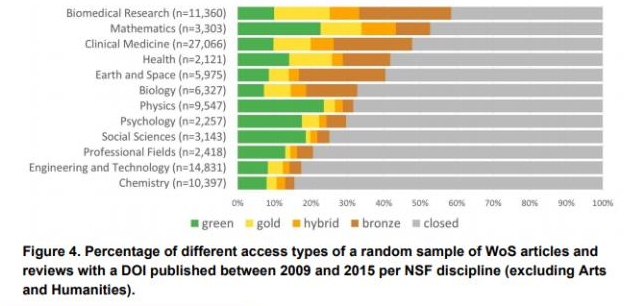Four Pillars of Open Science: Open Access

This is the first blog post from our new series exploring Open Science, placing the spotlight on each of the four pillars that form its foundation. This first post focuses on Open Access.
Open Science: “the practice of science in such a way that others can collaborate and contribute, where research data, lab notes and other research processes are freely available, under terms that enable reuse, redistribution and reproduction of the research and its underlying data and methods”. – FOSTER Plus
The varying terms, definitions, and policies associated with Open Access can be overwhelming. Publishers often have their own specific terminology to distinguish between their “pure” (fully Open Access) and “hybrid” (subscription journals with an option to publish articles in Open Access) offerings. Peter Suber, a renowned thought leader on the topic has written a comprehensive, yet easily digestible, introduction to Open Access for those who are new to the concept, or are seeking clarification on particular aspects. Though last updated in 2015, it still remains a valid resource in the academic community.
Latest mandates and guidance
As Open Access grows, policies and mandates are increasing at an institutional, consortia, and governmental level. Horizon 2020 is the European Union wide framework programme that aims to remove barriers to accessing scientific research – investing approximately €80 billion of funding over 7 years (2014 to 2020) with the stipulation that all results produced are made freely available online. Horizon 2020 also provides recommendations for member countries looking to implement national mandates. Those looking for up-to-date mandate information from institutions, funders, and publishers can consult these regularly maintained databases:
- ROARMAP, the Registry of Open Access Repository Mandates and Policies, charts the growth of mandates and policies worldwide. According to ROARMAP, there are currently 879 Open Access mandates and policies across the globe, including 657 from research organisations and 83 from funders.
- SHERPA Juliet covers funders' Open Access publishing policies, with information currently provided for 78 funders in the UK and 14 in the US.
- SHERPA Romeo can be used to search for Open Access policies on an individual journal level, as well as by publisher.
Open Access News
A recent study published in PeerJ analysed 300,000 papers. By analysing the findings, Heather Piwowar et al. estimated that 28% of all scholarly literature is Open Access. In 2015 (the most recent year of data analysed in the study), 45% of all papers were freely available to read online. The study also suggested that Open Access papers were cited 18% more than average (but it was also pointed out to the reader that this shouldn’t be the only metric used to measure impact).
As a result of the study, the authors coined the term “Bronze OA” to account for the large number of papers (around 18% in 2015) that were freely available online for a variety of reasons, but couldn’t be classed within existing categories due to licensing or other anomalies. The study found that Biomedical Research was the discipline (according to the National Science Foundation journal classification system) where researchers were most likely to publish Open Access, followed closely by Mathematics.

In an interview with The Scientist, co-author Jason Priem enthused that the data was “pretty compelling” in suggesting that open access papers will continue to increase in prevalence. He also noted, based on the results of the study, that he expects 95% of scholarly literature to be freely available to read online within the next twenty years.
4open policy on Open Access
All articles published by 4open are made freely and permanently accessible online immediately upon publication, with no embargo period. The full text will also be indexed in both PubMed Central and Europe PubMed Central. Copyright on any 4open article is retained by the author(s) under the Creative Commons license, permitting unrestricted use, distribution, and reproduction provided the original work is properly cited.
Upcoming Events
Want to learn more about Open Science? Here are a few upcoming events that may be of interest:
-
Open Science Fair Athens, 6th-8th September
EDP Sciences and 4open are proud to be a Bronze sponsor of this event.
Unable to attend this year? FoIlow the conversation on Twitter at #OSFair2017. -
MSCA Webinar: what does #OpenScience really mean? 11th-15th September
Science journalist Michele Catanzaro will conduct interviews with pioneering members of the Open Science community in the search for a concrete definition of Open Science and a roadmap for its implementation in academia. - Open Science Workshop, Vienna, 20th September 2017 Bianca Kramer and Jeroen Bosman from Utrecht University will discuss Open Science, using hands-on examples of Open Science tools and workflow examples across various disciplines.
-
COASP 20th-21st September 2017
This is a key event in the Open Access community calendar; EDP Sciences and 4open are silver sponsors and a number of the team will be attending. If you would like to discuss 4open, the EDP Sciences Open Access portfolio, or Open Access more generally, let us know by tweeting @EDPSciences or @4openjournal.
Useful Resources and Information on Open Science

The FOSTER Plus Project (“Facilitate Open Science Training for European Research”) - provides an e-learning platform collating the best training resources in Open Science, fostering the practical implementation of Open Science in Horizon 2020 and beyond. This two-year, EU-funded project aims to contribute a real and lasting shift in the behaviour of European researchers, ensuring that Open Science becomes the norm.

OASPA (Open Access Scholarly Publishers Association) is an association representing the interests of Open Access publishers globally. Every year OASPA holds a conference (COASP) bringing together key figures in the Open Access publishing community.
Next in this series, we will discuss Open Peer Review.
Keep up-to-date with 4open news and blogs by following 4open on Twitter: @4openjournal
